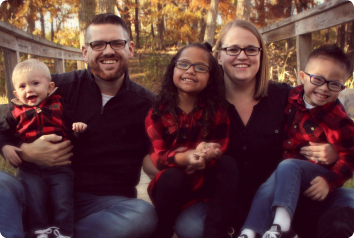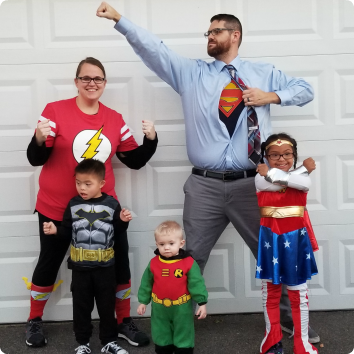 As parents to three amazing kids, we’ve found many things to be constant over the years: going to music festivals, a yearly trip to Duluth, nightly walks (when the weather permits), spending time with family, enjoying the lake, and finding any educational activities that we can do to embrace the many cultures in our family. Additionally, because our two oldest children, Kayella and Leo, have Down Syndrome, we are constantly active in our community, working to raise awareness and acceptance of people with Down Syndrome and the amazing things they can achieve.
As parents to three amazing kids, we’ve found many things to be constant over the years: going to music festivals, a yearly trip to Duluth, nightly walks (when the weather permits), spending time with family, enjoying the lake, and finding any educational activities that we can do to embrace the many cultures in our family. Additionally, because our two oldest children, Kayella and Leo, have Down Syndrome, we are constantly active in our community, working to raise awareness and acceptance of people with Down Syndrome and the amazing things they can achieve.
Yet, other aspects of parenting change quite a bit. In the past few years, as Kayella and Leo have aged, we’ve experienced a significant shift in our roles and focus as parents. For a long time, it seemed that our primary task was to be scheduler and taxi service for the near-constant therapy and doctor appointments. Please don’t misunderstand, we were happy to do it, because we understood how vital it was to establish a strong physical and cognitive base for our kids’ future development. And, we were fortunate enough to be able to manage it, with Jodi staying home with the kids while pursuing a degree and receiving help from the kids’ Personal Care Assistants. But, as our kids have aged and “graduated” from their various therapies, their needs from us have changed. Now, we have shifted into advocacy mode.
“As parents, we’ve always been advocates for our children.”
Of course this is not a new role. As parents, we’ve always been advocates for our children: establishing treatment plans, ensuring they were seeing the right specialists, setting up early education interventions, etc. But, the older our kids get, the harder some of these decisions become.
One of the biggest decisions we’ve recently had to make was around inclusion in school. Despite the fact that they both have Down Syndrome, Kayella and Leo could not be more different. Kayella has not experienced many of the health-related issues that are common in people with Down Syndrome nor does she struggle with significant cognitive delays. She is also extremely sociable, so when it was time for her to start kindergarten we felt that full inclusion in a regular classroom was her best option and we pushed hard for that to happen. And she thrived. She is now in 2nd grade and still in a fully-inclusive classroom. She is only slightly behind her typically developing classmates, and she has formed amazing and lasting friendships.
Leo just started kindergarten this year and our experience has been very different. He has struggled with his health, including immune deficiencies, and was also diagnosed with Autism Spectrum Disorder (ASD), both of which have impacted his social skills and interactions. So, even though we are huge proponents of full inclusion, we also knew that a typical classroom was likely not the best environment for him to learn in. The decision to enroll him in a center-based program was difficult, but I can say now that it was the best decision we could have made for him. His development over this past year has been amazing to see, and it is thanks to his teachers and the individualized attention they are able to give him.
“In order for our children to learn self-advocacy, we have to relinquish some control to them.”
One of the biggest changes we’ve experienced recently as parents is that we are now focused on teaching our children how to be self-advocates, which is a much harder task. In order for our children to learn self-advocacy, we have to relinquish some control to them—that can be terrifying for parents of a child with a disability. The world is full of opportunities to be taken advantage of, even neuro-typical people fall prey to hoaxes and scams.
 So how do we equip our children—who may not be able to understand all of the complexities of human interaction and have a tendency to trust and see good in everyone—to navigate the world on their own? With information, support and a heaping dose of skepticism. Now, I’m not saying we should teach them to distrust, but we should encourage them to ask questions and gather information before making decisions. After all, self-advocacy is great as long as they’re advocating for things that are healthy and safe. We must also provide them with information. Things that most people learn through observation and day-to-day interactions with their peers will likely need to be explicitly taught and explained to a child with Down Syndrome, over and over and over again. Finally, we need to help them build a strong support system of trusted people and safe places they can turn to if they have uncertainties or fears.
So how do we equip our children—who may not be able to understand all of the complexities of human interaction and have a tendency to trust and see good in everyone—to navigate the world on their own? With information, support and a heaping dose of skepticism. Now, I’m not saying we should teach them to distrust, but we should encourage them to ask questions and gather information before making decisions. After all, self-advocacy is great as long as they’re advocating for things that are healthy and safe. We must also provide them with information. Things that most people learn through observation and day-to-day interactions with their peers will likely need to be explicitly taught and explained to a child with Down Syndrome, over and over and over again. Finally, we need to help them build a strong support system of trusted people and safe places they can turn to if they have uncertainties or fears.
“The ultimate goal of every parent is to raise a child who is ready and able to go out on their own and conquer the world, and that goal should really be no different for our children.”
The ultimate goal of every parent is to raise a child who is ready and able to go out on their own and conquer the world, and that goal should really be no different for our children. The steps we take to achieve it however need to be more thoughtful, deliberate and tailored to the unique experiences and development of our children. At some point though, we as parents will need to let go, loosen our grip, and trust that they are ready to lead their lives. But for now, we prepare, we teach, we make decisions in the best interest of our children, and above all love and support them as they learn to make their own way.
About the Authors: Jodi and Ted Aschoff are the proud parents of three children. Kayella, is 8 years old and was adopted from Colombia in 2011 through LSS, Leo is 6 and joined their family in 2014 from Hong Kong, and Lennon will be 2 in July.


